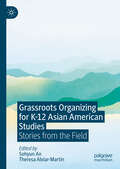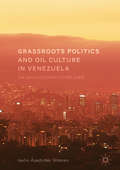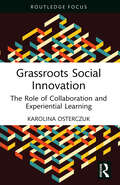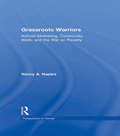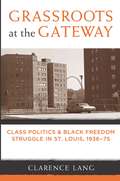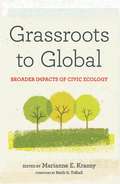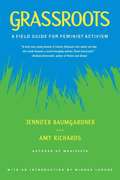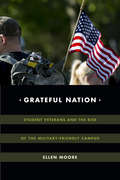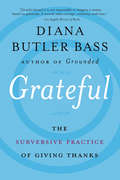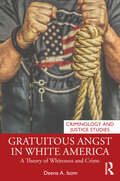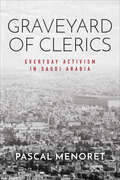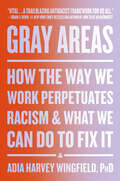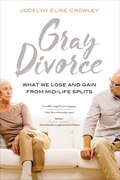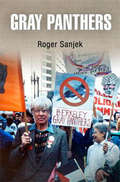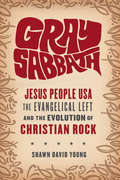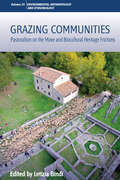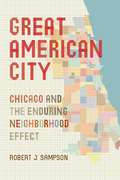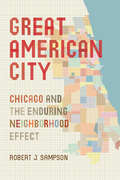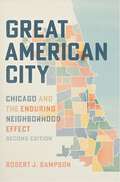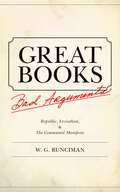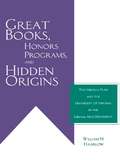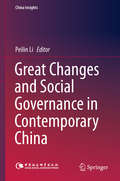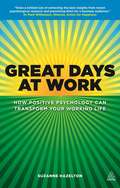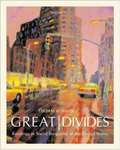- Table View
- List View
Grassroots Organizing for K-12 Asian American Studies: Stories from the Field
by Sohyun An Theresa Alviar-MartinThis edited book captures Asian American grassroot organizing in Georgia through counterstorytelling. Rooted in Critical Race Theory and traditions of narrative inquiry, counterstorytelling in educational research seeks to challenge dominant narratives by centering marginalized communities’ experiences and perspectives as sources of valuable knowledge. By employing AsianCrit, global citizenship education, human rights, and liberatory postcolonial education as theoretical lenses, the editors of this book interrupt essentialized portrayals of Asian Americans by featuring stories of Asian American students, parents, and educators who are fighting for Asian American Studies and Ethnic Studies in K-12 schools in Georgia. Their stories capture common as well as divergent experiences of being Asian American in the South and illuminate possibilities, challenges, and complexity of grassroots organizing for Asian American studies and ethnic studies in the South.
Grassroots Politics and Oil Culture in Venezuela: The Revolutionary Petro-State
by Iselin Åsedotter StrønenThis book is published open access under a CC BY 4.0 license.This book presents an ethnographic study of how grassroots activism in Venezuela during the Chávez presidency can be understood in relation to the country's history as a petro-state. Taking the contested relationship between the popular sectors and the Venezuelan state as a point of departure, Iselin Åsedotter Strønen explores how notions such as class, race, state, bureaucracy, popular politics, capitalism, neoliberalism, consumption, oil wealth, and corruption gained salience in the Bolivarian process. A central argument is that the Bolivarian process was an attempt to challenge the practices, ideas, and values inherited from Venezuela's historical development as an oil-producing state. Drawing on rich ethnographic material from Caracas' shantytowns, state institutions, as well as everyday life and public culture, Strønen explores the complexities and challenges in fostering deep social and political change.
Grassroots Social Innovation: The Role of Collaboration and Experiential Learning (Routledge Focus on Business and Management)
by Karolina OsterczukThis book examines the transformative power of grassroots social innovations within dynamic urban landscapes. From addressing access to healthy food to navigating regulatory challenges, urban citizens are taking charge of their environments through collective action. This ethnographic exploration explores the everyday workings of three grassroots initiatives, highlighting the practices driving social change.Readers will discover practical models for collective organizing within social innovation communities, offering insights for both activists and policymakers eager to effect change in urban life. By emphasizing collaboration as a cornerstone of social innovation, this book illuminates how deep engagement fosters reflectivity, empathy, and sustainability within communities. Drawing on multidimensional collaboration models, readers gain practical tools for creating lasting social impact.Moreover, the book places these insights within a broader European context and references Elinor Ostrom's theory of the common good, appealing to readers worldwide interested in community-driven solutions. With qualitative research conducted in Poland, this book offers a rich tapestry of insights into the global phenomenon of grassroots social innovation, encouraging reflection and action among urban communities worldwide.
Grassroots Warriors: Activist Mothering, Community Work, and the War on Poverty (Perspectives on Gender)
by Nancy A. NaplesFirst published in 1998. Routledge is an imprint of Taylor & Francis, an informa company.
Grassroots at the Gateway
by Clarence Lang"This is a theoretically sophisticated and thoroughly documented historical case study of the movements for African American liberation in St. Louis. Through detailed analysis of black working class mobilization from the depression years to the advent of Black Power, award-winning historian Clarence Lang describes how the advances made in earlier decades were undermined by a black middle class agenda that focused on the narrow aims of black capitalists and politicians. The book is a major contribution to our understanding of the black working class insurgency that underpinned the civil rights and Black Power campaigns of the twentieth century. " ---V. P. Franklin, University of California, Riverside "A major work of scholarship that will transform historical understanding of the pivotal role that class politics played in both civil rights and Black Power activism in the United States. Clarence Lang's insightful, engagingly written, and well-researched study will prove indispensable to scholars and students of postwar American history. " ---Peniel Joseph, Brandeis University Breaking new ground in the field of Black Freedom Studies,Grassroots at the Gatewayreveals how urban black working-class communities, cultures, and institutions propelled the major African American social movements in the period between the Great Depression and the end of the Great Society. Using the city of St. Louis in the border state of Missouri as a case study, author Clarence Lang undermines the notion that a unified "black community" engaged in the push for equality, justice, and respect. Instead, black social movements of the working class were distinct from---and at times in conflict with---those of the middle class. This richly researched book delves into African American oral histories, records of activist individuals and organizations, archives of the black advocacy press, and even the records of the St. Louis' economic power brokers whom local black freedom fighters challenged. Grassroots at the Gatewaycharts the development of this race-class divide, offering an uncommon reading of not only the civil rights movement but also the emergence and consolidation of a black working class. Clarence Lang is Assistant Professor in African American Studies and History at the University of Illinois at Urbana-Champaign. Photo courtesy Western Historical Manuscript Collection, University of Missouri, St. Louis
Grassroots to Global: Broader Impacts of Civic Ecology
by David MaddoxAddressing participatory, transdisciplinary approaches to local stewardship of the environment, Grassroots to Global features scholars and stewards exploring the broad impacts of civic engagement with the environment.Chapters focus on questions that include: How might faith-based institutions in Chicago expand the work of church-community gardens? How do volunteer "nature cleaners" in Tehran attempt to change Iranian social norms? How does an international community in Baltimore engage local people in nature restoration while fostering social equity? How does a child in an impoverished coal mining region become a local and national leader in abandoned mine restoration? And can a loose coalition that transforms blighted areas in Indian cities into pocket parks become a social movement? From the findings of the authors’ diverse case studies, editor Marianne Krasny provides a way to help readers understand the greater implications of civic ecology practices through the lens of multiple disciplines.Contributors:Aniruddha Abhyankar, Martha Chaves, Louise Chawla, Dennis Chestnut, Nancy Chikaraishi, Zahra Golshani, Lance Gunderson, Keith E. Hedges, Robert E. Hughes, Rebecca Jordan, Karim-Aly Kassam, Laurel Kearns, Marianne E. Krasny, Veronica Kyle, David Maddox, Mila Kellen Marshall, Elizabeth Whiting Pierce, Rosalba Lopez Ramirez, Michael Sarbanes, Philip Silva, Traci Sooter, Erika S. Svendsen, Keith G. Tidball, Arjen E. J. Wals, Rebecca Salminen Witt, Jill Wrigley
Grassroots: A Field Guide for Feminist Activism
by Jennifer Baumgardner Amy RichardsFrom the authors of Manifesta, an activism handbook that illustrates how to truly make the personal political. Grassroots is an activism handbook for social justice. Aimed at everyone from students to professionals, stay-at-home moms to artists, Grassroots answers the perennial question: What can I do? Whether you are concerned about the environment, human rights violations in Tibet, campus sexual assault policies, sweatshop labor, gay marriage, or the ongoing repercussions from 9-11, Jennifer Baumgardner and Amy Richards believe that we all have something to offer in the fight against injustice. Based on the authors' own experiences, and the stories of both the large number of activists they work with as well as the countless everyday people they have encountered over the years, Grassroots encourages people to move beyond the "generic three" (check writing, calling congresspeople, and volunteering) and make a difference with clear guidelines and models for activism. The authors draw heavily on individual stories as examples, inspiring readers to recognize the tools right in front of them--be it the office copier or the family living room--in order to make change. Activism is accessible to all, and Grassroots shows how anyone, no matter how much or little time they have to offer, can create a world that more clearly reflects their values.
Grateful Nation: Student Veterans and the Rise of the Military-Friendly Campus
by Ellen MooreIn today's volunteer military many recruits enlist for the educational benefits, yet a significant number of veterans struggle in the classroom, and many drop out. The difficulties faced by student veterans have been attributed to various factors: poor academic preparation, PTSD and other postwar ailments, and allegedly antimilitary sentiments on college campuses. In Grateful Nation Ellen Moore challenges these narratives by tracing the experiences of Iraq and Afghanistan war veterans at two California college campuses. Drawing on interviews with dozens of veterans, classroom observations, and assessments of the work of veteran support organizations, Moore finds that veterans' academic struggles result from their military training and combat experience, which complicate their ability to function in civilian schools. While there is little evidence of antimilitary bias on college campuses, Moore demonstrates the ways in which college programs that conflate support for veterans with support for the institutional military lead to suppression of campus debate about the wars, discourage antiwar activism, and encourage a growing militarization.
Grateful: The Transformative Power of Giving Thanks
by Diana Butler BassThe author of the multiple award-winning Grounded and leading trend spotter in contemporary Christianity explores why gratitude is missing as a modern spiritual practice, offers practical suggestions for reclaiming it, and illuminates how the shared practice of gratitude can lead to greater connection with God, our world, and our own souls.More and more people are finding God beyond the walls of traditional religious institutions, but these seekers often miss the church community itself, including its shared spiritual practices such as gratitude. While four out of five Americans have told pollsters they feel gratitude in their daily lives, cultural commentator and religion expert Diana Butler Bass finds that claim to be at odds with the discontent that permeates modern society.There is a gap, she argues, between our desire to be grateful and our ability to behave gratefully—a divide that influences our understanding of morality, worship, and institutional religion itself. In Grateful, Bass challenges readers to think about the impact gratitude has in our spiritual lives, and encourages them to make gratitude a "difficult and much-needed spiritual practice for our personal lives and to make a better world."Grateful is partially an individual, emotional response to our circumstances, but research has shown that what we often miss is how much more it is a communal, actionable response. Bass examines this more unexpected experience of gratitude, and reveals how people and communities can practice it and thrive, whether or not they are part of a traditional religious community.
Gratuitous Angst in White America: A Theory of Whiteness and Crime (Criminology and Justice Studies)
by Deena A. IsomGratuitous Angst in White America presents a new criminological theory that explains the racialized experiences of white people. Unlike orthodox traditions that assume whiteness as normative or progressive traditions that center the experiences of the marginalized and oppressed, the theory of whiteness and crime flips those perspectives and turns a lens toward white people’s lived experiences and the ideologies of whiteness. The theory of whiteness and crime answers two overarching questions: How does being white impact one’s likelihood of engaging in deviant, criminal, and/or violent behaviors? And, why are white people treated differently than other racial and ethnic groups by the criminal legal system? Through the application of a critical whiteness perspective to criminology, the theory of whiteness and crime is an intersectional and integrated framework that explains within (and between) group differences in negative behaviors and entanglements with the criminal legal system.This book examines the racialized history of America to contextualize the current racial strife in society and inform a more nuanced theoretical approach to explaining disparities. The reader will gain a socio-historical understanding of the depths of the current divides and insight into how such are perpetuated and potentially dismantled. Students will see connections between various theoretical traditions and an application of theory to current social conditions. Researchers will acquire a new theoretical foundation and propositions to ground empirical work that will fill extensive gaps in the criminological literature. And policy makers will see how oversights in understanding the depths of historical significance perpetuate and increase disparities and disadvantages, which are counter to a pursuit of justice.Written in a compelling and direct way, this book will appeal to those in criminology, sociology, race and ethnic studies, gender and sexuality studies, political science, cultural studies, psychology, criminal justice, law, and beyond. Gratuitous Angst in White America is essential for those seeking a more complete understanding of the associations between race and crime and those who want to remedy those disparities. In the end, it is more than a new theory of crime, it is a call to action for all willing to hear.
Graveyard of Clerics: Everyday Activism in Saudi Arabia (Stanford Studies in Middle Eastern and Islamic Societies and Cultures)
by Pascal MenoretThe inside story of political protest in Saudi Arabia—on the ground, in the suburbs, and in the face of increasing state repression. Graveyard of Clerics takes up two global phenomena intimately linked in Saudi Arabia: urban sprawl and religious activism. Saudi suburbia emerged after World War II as citizens fled crowded inner cities. Developed to encourage a society of docile, isolated citizens, suburbs instead opened new spaces for political action. Religious activists in particular turned homes, schools, mosques, and summer camps into resources for mobilization. With the support of suburban grassroots networks, activists won local elections and found opportunities to protest government actions—until they faced a new wave of repression under the current Saudi leadership. Pascal Menoret spent four years in Saudi Arabia in the places where today's Islamic activism first emerged. With this book, he tells the stories of the people actively countering the Saudi state and highlights how people can organize and protest even amid increasingly intense police repression. This book changes the way we look at religious activism in Saudi Arabia. It also offers a cautionary tale: the ongoing repression by Saudi elites—achieved often with the complicity of the international community—is shutting down grassroots political movements with significant consequences for the country and the world.
Gray Areas: How the Way We Work Perpetuates Racism and What We Can Do to Fix It
by Adia Harvey WingfieldGray Areas has descriptive copy which is not yet available from the Publisher.
Gray Divorce: What We Lose and Gain from Mid-Life Splits
by Jocelyn CrowleyAfter twenty, thirty, or even forty years of marriage, countless vacations together, raising well-adjusted children, and sharing property and finances—what could go wrong? Gray Divorce offers a provocative look at the growing rate of marital splits after the age of 50, showcasing the voices of men and women who are considering, going through, or have undergone one. With empathy and insight, Jocelyn Crowley, who has written widely on family issues, uncovers the reasons for why men and women divorce—and the penalties and benefits that each pay for their choice. From the outside, many may ask why couples in mid-life and readying for retirement choose to make a drastic change in their marital status. Yet nearly 1 out of every 4 divorces is “gray.” Crowley sheds light on why divorce occurs—seeing marriage in a different lens, understanding the seismic shift in individual priorities, and the impact of the increase in life expectancy. With a deft eye, she analyzes the experiences of women and men as they go through this life transition—specifically how women are affected economically while men are affected socially. With a realistic yet passionate voice, Crowley shares the personal positive outlooks and the necessary supportive public policies that must take place to best help new divorcees. Engaging and instructive, Gray Divorce is a must-read for anyone interested in contemporary American culture.
Gray Panthers
by Roger SanjekIn 1970, a sixty-five-year-old Philadelphian named Maggie Kuhn began vocally opposing the notion of mandatory retirement. Taking inspiration from the civil rights and anti-Vietnam War movements, Kuhn and her cohorts created an activist organization that quickly gained momentum as the Gray Panthers. After receiving national publicity for her efforts--she even appeared on the Tonight Show with Johnny Carson--she gained thousands of supporters, young and old. Their cause expanded to include universal health care, nursing home reform, affordable and accessible housing, defense of Social Security, and elimination of nuclear weapons.Gray Panthers traces the roots of Maggie Kuhn's social justice agenda to her years as a YWCA and Presbyterian Church staff member. It tells the nearly forty-year story of the intergenerational grassroots movement that Kuhn founded and its scores of local groups. During the 1980s, more than one hundred chapters were tackling local and national issues. By the 1990s the ranks of older members were thinning and most young members had departed, many to pursue careers in public service. But despite its challenges, including Kuhn's death in 1995, the movement continues today.Roger Sanjek examines Gray Panther activism over four decades. Here the inner workings and dynamics of the movement emerge: the development of network leadership, local projects and tactics, conflict with the national office, and the intergenerational political ties that made the group unique among contemporary activist groups. Part ethnography, part history, part memoir, Gray Panthers draws on archives and interviews as well as the author's thirty years of personal involvement. With the impending retirement of the baby boomers, Sanjek's book will surely inform the debates and discussions to follow: on retirement, health care, and many other aspects of aging in a society that has long valued youth above all.
Gray Sabbath: Jesus People USA, the Evangelical Left, and the Evolution of Christian Rock
by Shawn YoungFormed in 1972, Jesus People USA is an evangelical Christian community that fundamentally transformed the American Christian music industry and the practice of American evangelicalism, which continues to evolve under its influence. In this fascinating ethnographic study, Shawn David Young replays not only the growth and influence of the group over the past three decades but also the left-leaning politics it developed that continue to serve as a catalyst for change.Jesus People USA established a still-thriving Christian commune in downtown Chicago and a ground-breaking music festival that redefined the American Christian rock industry. Rather than join "establishment" evangelicalism and participate in what would become the megachurch movement, this community adopted a modified socialism and embraced forms of activism commonly associated with the New Left. Today the ideological tolerance of Jesus People USA aligns them closer to liberalism than to the religious right, and Young studies the embodiment of this liminality and its challenge to mainstream evangelical belief. He suggests the survival of this group is linked to a growing disenchantment with the separation of public and private, individual and community, and finds echoes of this postmodern faith deep within the evangelical subculture.
Grazing Communities: Pastoralism on the Move and Biocultural Heritage Frictions (Environmental Anthropology and Ethnobiology #29)
by Letizia BindiPastoralism is a diffused and ancient form of human subsistence and probably one of the most studied by anthropologists at the crossroads between continuities and transformations. The present critical discourse on sustainable and responsible development implies a change of practices, a huge socio-economic transformation, and the return of new shepherds and herders in different European regions. Transhumance and extensive breeding are revitalized as a potential resource for inner and rural areas of Europe against depopulation and as an efficient form of farming deeply influencing landscape and functioning as a perfect eco-system service. This book is an occasion to reconsider grazing communities’ frictions in the new global heritage scenario.
Great American City
by Robert J. SampsonFor over fifty years numerous public intellectuals and social theorists have insisted that community is dead. Some would have us believe that we act solely as individuals choosing our own fates regardless of our surroundings, while other theories place us at the mercy of global forces beyond our control. These two perspectives dominate contemporary views of society, but by rejecting the importance of place they are both deeply flawed. Based on one of the most ambitious studies in the history of social science, Great American City argues that communities still matter because life is decisively shaped by where you live. To demonstrate the powerfully enduring impact of place, Robert J. Sampson presents here the fruits of over a decade’s research in Chicago combined with his own unique personal observations about life in the city, from Cabrini Green to Trump Tower and Millennium Park to the Robert Taylor Homes. He discovers that neighborhoods influence a remarkably wide variety of social phenomena, including crime, health, civic engagement, home foreclosures, teen births, altruism, leadership networks, and immigration. Even national crises cannot halt the impact of place, Sampson finds, as he analyzes the consequences of the Great Recession and its aftermath, bringing his magisterial study up to the fall of 2010. Following in the influential tradition of the Chicago School of urban studies but updated for the twenty-first century, Great American City is at once a landmark research project, a commanding argument for a new theory of social life, and the story of an iconic city.
Great American City: Chicago and the Enduring Neighborhood Effect
by Robert J. SampsonFor over fifty years numerous public intellectuals and social theorists have insisted that community is dead. Some would have us believe that we act solely as individuals choosing our own fates regardless of our surroundings, while other theories place us at the mercy of global forces beyond our control. These two perspectives dominate contemporary views of society, but by rejecting the importance of place they are both deeply flawed. Based on one of the most ambitious studies in the history of social science, Great American City argues that communities still matter because life is decisively shaped by where you live. To demonstrate the powerfully enduring impact of place, Robert J. Sampson presents here the fruits of over a decade’s research in Chicago combined with his own unique personal observations about life in the city, from Cabrini Green to Trump Tower and Millennium Park to the Robert Taylor Homes. He discovers that neighborhoods influence a remarkably wide variety of social phenomena, including crime, health, civic engagement, home foreclosures, teen births, altruism, leadership networks, and immigration. Even national crises cannot halt the impact of place, Sampson finds, as he analyzes the consequences of the Great Recession and its aftermath, bringing his magisterial study up to the fall of 2010. Following in the influential tradition of the Chicago School of urban studies but updated for the twenty-first century, Great American City is at once a landmark research project, a commanding argument for a new theory of social life, and the story of an iconic city.
Great American City: Chicago and the Enduring Neighborhood Effect
by Robert J. SampsonGreat American City demonstrates the powerfully enduring impact of place. Based on one of the most ambitious studies in the history of social science, Robert J. Sampson’s Great American City presents the fruits of over a decade’s research to support an argument that we all feel and experience every day: life is decisively shaped by your neighborhood. Engaging with the streets and neighborhoods of Chicago, Sampson, in this new edition, reflects on local and national changes that have transpired since his book’s initial publication, including a surge in gun violence and novel forms of segregation despite an increase in diversity. New research, much of it a continuation of the influential discoveries in Great American City, has followed, and here, Sampson reflects on its meaning and future directions. Sampson invites readers to see the status of the research initiative that serves as the foundation of the first edition—the Project on Human Development in Chicago Neighborhoods (PHDCN)—and outlines the various ways other scholars have continued his work. Both accessible and incisively thorough, Great American City is a must-read for anyone interested in cutting-edge urban sociology and the study of crime.
Great Books, Bad Arguments: Republic, Leviathan, and The Communist Manifesto
by W. G. RuncimanWhy Plato, Hobbes, and Marx are great—despite their argumentsPlato's Republic, Hobbes's Leviathan, and Marx's Communist Manifesto are universally acknowledged classics of Western political thought. But how strong are the core arguments on which they base their visions of the good society that they want to bring into being? In this lively and provocative book, W. G. Runciman shows where and why they fail, even after due allowance has been made for the different historical contexts in which they wrote. Plato, Hobbes, and Marx were all passionately convinced that justice, peace, and order could be established if only their teachings were implemented and the right people put into power. But Runciman makes a powerful case to the effect that all three were irredeemably naive in their assumptions about how human societies function and evolve and how human behavior could be changed. Yet despite this, Runciman insists that Republic, Leviathan, and The Communist Manifesto remain great books. Born of righteous anger and frustration, they are masterfully eloquent pleas for better worlds—worlds that Plato, Hobbes, and Marx cannot bring themselves to admit to be unattainable.
Great Books, Honors Programs, and Hidden Origins: The Virginia Plan and the University of Virginia in the Liberal Arts Movement (Studies in the History of Education)
by William HaarlowFirst Published in 2004. Routledge is an imprint of Taylor & Francis, an informa company.
Great British Plans: Who made them and how they worked (Planning, History and Environment Series)
by Ian WrayCan the British plan? Sometimes it seems unlikely. Across the world we see grand designs and visionary projects: new airport terminals, nuclear power stations, high-speed railways, and glittering buildings. It all seems an unattainable goal on Britain’s small and crowded island; and yet perhaps this is too pessimistic. For the British have always planned, and much of what they have today is the result of past plans, successfully implemented. Ranging widely, from London’s squares and the new city of Milton Keynes, to ‘High Speed One’, the motorways, and the secret first electronic computers, Ian Wray’s remarkable book puts successful infrastructure plans under the microscope. Who made these plans and what made them stick? How does this reflect the defining characteristics of British government? And what does that say about the individuals who drew them up and saw them through? In so doing the book casts refreshing new light on how big decisions have actually been made, revealing the hidden sources of drive and initiative in British society, as seen through the lens of ‘plans past’. And it asks some searching questions about the mechanisms we might need for successful ‘plans future’, in Britain and elsewhere.Includes foreword by the Right Honourable the Lord Heseltine CH.
Great Changes and Social Governance in Contemporary China
by Peilin LiThis book offers a comprehensive review of the far-reaching social changes that have taken place since the start of the Chinese economic reform and opening up of Chinese society over 30 years ago. As such, it examines various aspects of the social transformation of China, from urbanization, population aging and social governance to family structure, youth society and social mentality. It identifies major issues and challenges emerging during the process of the great social change, and proposes solutions to aid in future strategic planning. The analysis is supported by a wealth of empirical data collected in the course of extended social survey research. The book also provides a systematic summary of the most important research findings from the past few years, helping readers to understand and interpret the ongoing and complex process of transformation in Chinese society.
Great Days at Work
by Suzanne HazeltonGreat Days at Work will enable you to become more enthusiastic at work, feel more positive and work more effectively with others. Drawing on the latest insights from positive psychology, it outlines practical day-to-day changes you can make immediately for instant benefit, as well as helping you develop a longer term version that means you'll get more out of work. The book is based on a three-layered framework, with the first layer focusing on the mindset for change, the second on personal responsibility, and the third on vision and choice. It reveals how to use these layers to develop an effective perspective on time, embed productive new habits, gain a clear sense of self and work better with others. As a result you will make a bigger contribution to your organization, as well as feeling more engaged, satisfied and in control of your own work and career. Discover how to have a great day at work, every day!
Great Divides: Readings in Social Inequality in the United States (3rd edition)
by Thomas M. ShapiroGREAT DIVIDES IS about the barriers that keep groups and individuals apart from one another in the United States.
